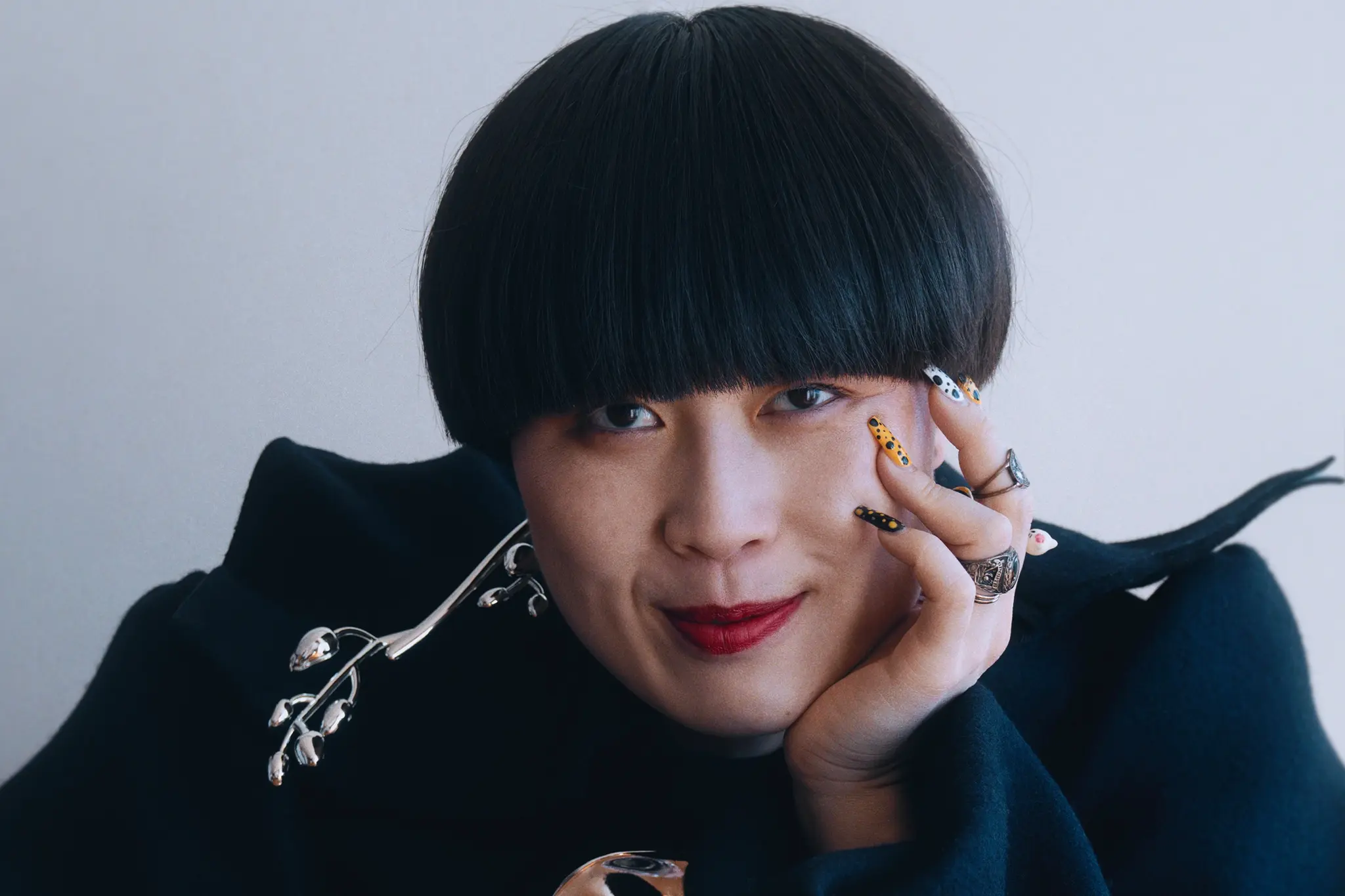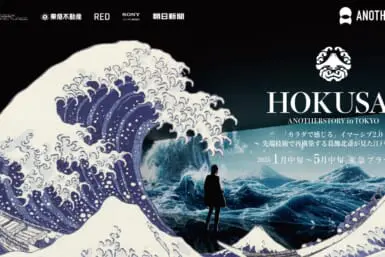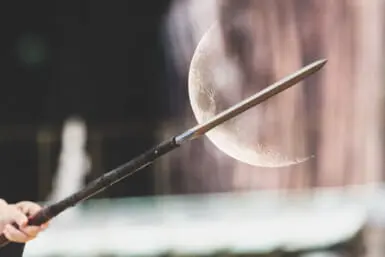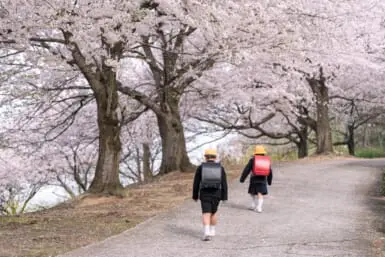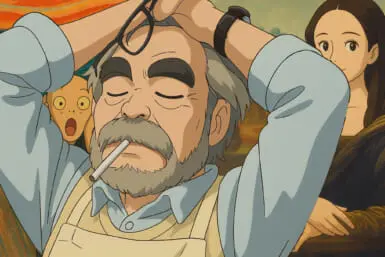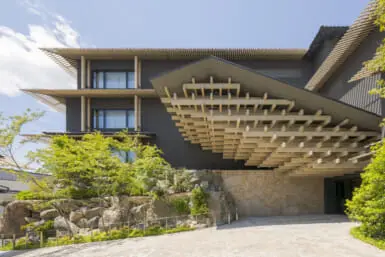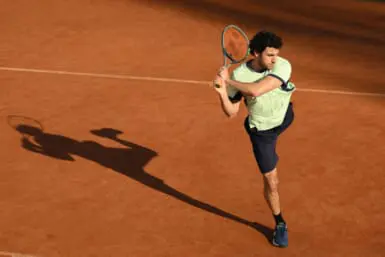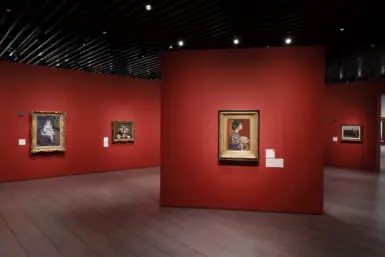This article appeared in Tokyo Weekender Vol. 1, 2025.
To read the entire issue, click here.
The comedian Atsuko Okatsuka is artfully sprawled across a sofa in the largest suite at the Andaz Tokyo Toranomon Hills, clad in a cascade of deep plum-colored tulle, an ornate silver neck piece and an architectural jacket. Light streams in from the floor-to-ceiling windows, illuminating her freckled skin as a photographer rapidly clicks away. The whole room is rapt, watching her ease with the camera, until Okatsuka suddenly raises her arms, swathed in voluminous black sleeves that cover her hands, and takes stock of her own pose. “It’s giving dead seal washed up on shore,” she gleefully proclaims.
Okatsuka, who is Taiwanese-Japanese and currently based in Los Angeles, is in Tokyo to perform eight sold-out shows as part of her international Full Grown Tour. It’s been a whirlwind few years for her: She’s been interviewed by the likes of Stephen Colbert on The Late Show and Chelsea Handler on Jimmy Kimmel Live!; she was named one of Variety‘s Top 10 Comics to Watch in 2022; the same year, she became the second Asian American woman to have a comedy special on HBO with “The Intruder,” which was also named the best debut comedy show of the year by The New York Times.
Okatsuka’s comedy has an unmistakably silly quality to it. She cavorts around the stage making exaggerated facial expressions, often delivering her punchlines with a childlike frankness. This silliness lends itself well to lighthearted topics, but her real genius lies in using it to navigate darker themes. She has a sharp eye for absurdity, effortlessly transforming it into something unexpectedly, almost improbably, hilarious.
Growing up, “I was always wanting to point out the absurd in a situation,” Okatsuka says. “I really like observing things and making a situation better. There’s always something funny in sadness.”
She continues, “That’s I guess where my quote-unquote passion for comedy comes from — wanting people to not feel alone and to cheer people up.”
“Technically, It Was a Kidnapping”
Okatsuka’s comedy heavily references her own life and, well, there’s quite a lot to reference. She was born to a Japanese father and a Taiwanese mother who met on a Japanese dating show in the 80s. They divorced shortly after she was born. In her early years, Okatsuka lived in Chiba, first with her father, then with her mother and grandmother. Her mother struggled with her mental health — she would later be diagnosed with schizophrenia — and as her struggles became more pronounced, Okatsuka’s grandmother decided to take action. She brought her daughter and then-eight-year-old granddaughter on what she initially described as a two-month vacation to Los Angeles to visit family.
Instead of returning to Japan after the two months were up, however, the three women continued living in a family member’s garage, undocumented, for seven years. Okatsuka’s grandmother had brought her to the States out of love, from a desire to protect her and give her a better life, but for a long time, Okatsuka wondered if she’d been kidnapped. She even did a This American Life episode devoted to the question.
The answer, as it turns out, is yes. “My father had full custody of me, and [my grandma] told us it was just a two-month vacation and then didn’t bring me back … So, yeah, technically it was a kidnapping,” she says. You can see why her ability to find humor in even the most serious of circumstances has come in useful.
Growing Up Between Cultures and Generations
At age eight, thrown into a new country, Okatsuka had to acclimate to a new culture and learn a new language. “I watched Scooby-Doo to help me learn English,” she recalls. “I think you can see that in my comedy — I’m a bit cartoonish. I use my eyes and physicality a lot. I don’t use difficult English words. All of that is because there’s three cultures in me.”
Given her mother’s mental health issues and her father living far away, Okatsuka was raised almost exclusively by her grandmother, which came with its own unique struggles. “When I went through puberty, when I got my period, how to talk to boys — she didn’t know how to help me. She was like, ‘I married the first boy that talked to me. I haven’t dated since 1950.’”
Okatsuka’s close relationship with her grandmother is something she touches on in her sets. It also appears on her social media, in videos that spotlight their shared sense of humor and joy in each other’s company — dancing together in the grocery store or at a hospital appointment, for instance, or joking around while underwear shopping at T.J. Maxx. “She’s my best friend, but I joke that it’s Stockholm syndrome. People are complex, right? Now I’m her caretaker, like how she cared for me when I was young. It’s full circle. It’s what Mufasa, the movie, is about, probably.”
Musing on their closeness, Okatsuka assumes an air of pontification. “I always say, if you’re trying to get the approval of your parents, stop doing that, because they’re too busy still trying to get the approval of their parents. Skip your parents. Your grandparents are who you’ll get along with. Because you didn’t disappoint your grandparents — they’re disappointed in your parents.” As with a lot of things she says, Okatsuka is kind of joking, but also most definitely not.

Finding the Absurd
Something else about Okatsuka: She’s really great at going viral. The short videos she posts on her Instagram are delightful and strange, showcasing her talent for storytelling and awareness of what draws people in. “As a comedian, you’re like an anthropologist or a sociologist,” she says. “To be able to know what works universally, you kind of have to be a mind reader. And I love that.”
Her first-ever internet sensation occurred during the pandemic: the #DropChallenge, where participants suddenly stop whatever they’re doing and drop into a low squat to the beat of Beyoncé’s “Partition.” Those who have heeded the drop challenge include celebrities like Serena Williams and the cast of Saturday Night Live; the original version had a mask-clad Okatsuka sinking to the ground in a variety of public places beside her bemused grandmother.
“That was just me and my grandma having fun in Little Tokyo,” she says. “It’s not a new song, but I always loved that beat drop, so I was like, ‘What if my whole body also goes down, every time, everywhere I am?’”
It’s easy to see the universal appeal in something like dropping it low to Beyoncé. But Okatsuka manages to find it in incredibly niche and bizarre situations as well. Take, for instance, the insouciant vlog she posted of herself and her husband getting married at City Hall, seven years after their actual wedding, because they realized that they’d never actually filed their marriage certificate. Or the video documenting her first-ever meeting with her 50-year-old half-brother at a ninja theme park in Japan, where she breezily and warmly asks him what he’s been up to for the past few decades. Or a clip from one of her live sets, where she talks the crowd through a 7.1 magnitude earthquake that struck shortly after she got on stage. (“I am not equipped for this … I went to art school,” she jokes.)
Okatsuka’s ethos is clear in each of these: Life is full of absurdities, so you might as well laugh — or, better yet, find someone to laugh at it all with you. “[If you’re] being your authentic self, if you have fun, it’s going to show, and people are going to want to join in,” she says.
Beneath the Bowl Cut
Any profile of Okatsuka would be incomplete without mention of her iconic bowl cut. “I got this hair in 2018. I was hosting a game show, and I wanted to create a look that felt like me,” she says.
It is — as she notes in another video, which shows her alongside an identically coiffed toddler — a haircut one often sees on Japanese babies. For her, that was part of the appeal. “This is the hair I had when I was a kid. People are embarrassed about this haircut that their parents forced on them, but I thought, ‘What if I rocked this hair that people were made fun of for?’ I also just thought it was very fashion and very chic, and I’ve kept it since.”
Okatsuka is known for her eccentric, maximalist sense of style — bright colors, swooping silhouettes, patterns on patterns and large, sculptural earrings, often in the shape of food. Her approach to fashion, at its core, is similar to her view on comedy: driven by the desire to make others happy. “I want other people to feel good,” she explains. “I don’t see myself all day, but other people do.”
It’s a simple but moving sentiment, one that’s mirrored in Okatsuka’s approach to her art, and to life in general. For her, humor is primarily about connecting, about moments of shared silliness and absurdity, often in spite of serious situations. “Stand-up comedy is literally saying something that people are like, ‘Oh, my God! That’s so true!’” she says. “It makes people feel seen.”
Atsuko Okatsuka’s comedy special will be available for streaming in June 2025.
In the meantime, follow her on Instagram here.

